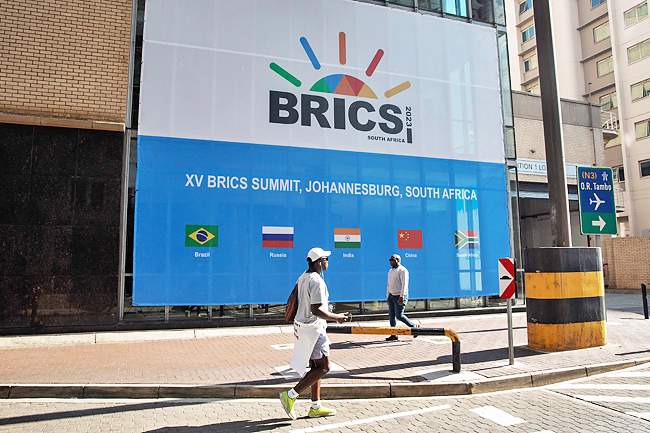AFP – The BRICS countries, an acronym of the five members Brazil, Russia, India, China and South Africa, meet for three days for a summit in Johannesburg starting tomorrow.
Here are some facts and figures about the BRICS
A NEW WORLD ORDER?
A group of emerging economies, it was formally launched in 2009 and it meets yearly at a summit hosted in rotation by one of the member countries.
The meetings aim to assert their position particularly in relation to the United States and the European Union.
It promotes the recognition of a multipolar global order with economic and political balance, with the aim of breaking away from organisations formed in the post-World War II era, such as the World Bank and the International Monetary Fund (IMF).

ASPIRANTS
The bloc whose economic growth is mainly driven by China and India, is now open to expansion.
Twenty three candidates have applied to join the BRICS, and an almost similar number have expressed an interest – among them Argentina, Ethiopia, Iran and Saudi Arabia.
One of the attractions of the group is the New Development Bank, created in 2015 with the aim of offering an alternative to the World Bank and the IMF.
The Shanghai-headquartered bank has since invested USD30 billion in infrastructure development projects in member states and other developing economies.
AN OLD ALLY
Preparations for the summit saw diplomatic tensions rise on the global stage after host President Cyril Ramaphosa invited Russia’s President Vladimir Putin who is the target of an International Criminal Court (ICC) arrest warrant over the war in Ukraine.
Following months of speculation, Pretoria finally said Putin will attend the summit via video link.
South Africa’s ruling ANC party forged relations with Moscow during the Cold War, when the Soviet Union backed its fight against apartheid.
DOWN WITH THE DOLLAR
The five countries account for 18 per cent of international trade, the majority of which is transacted in dollars.
Critical of the greenback’s predominance in world trade, one of their goals is to free themselves from the dollar.
The bloc supports the increased use of members’ national currencies for trade and the introduction of a common payment system in the long term.
Brazil and China earlier this year signed a bilateral agreement to settle their trade in their local currencies.
UNIVERSITY RANKINGS
A meeting of BRICS education ministers last month announced their intention to create their own international university rankings.
Moscow believes that Russian universities are being excluded from existing international rankings for political reasons.



